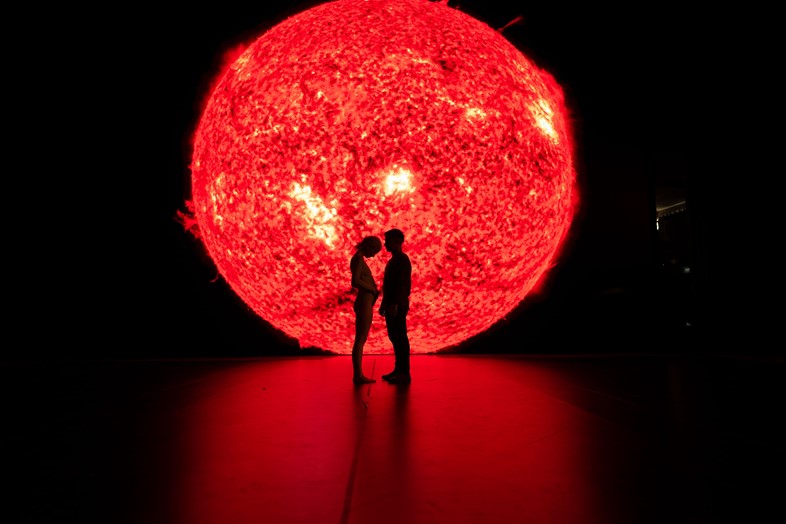The Pablo Larraín-directed film, which premieres for free on MUBI today, tells the electrifying tale of a couple in the wake of an adoption gone wrong
- TextJack Moss
It is currently rainy season in Mexico and the actor Gael García Bernal has been enjoying watching the plants grow on his terrace garden in the country’s capital – “I love it,” he enthuses. If this seems like the esoteric musings of a movie star, Bernal is – like the rest of us – confined to his home, where the simple pleasures of a change in season are enough to ignite a wave of enthusiasm emphatic enough to translate over a transatlantic Zoom call. “Everything becomes so full of trees and plants and animals,” he intonates. “It’s so vivid.”
The Guadalajara-born actor – who first found fame in Alejandro González Iñárritu’s Amores Perros in 2000, and a year later, a lauded turn in Alfonso Cuarón’s Y Tu Mamá También – is finding other unexpected balms to confinement, like finally having time to watch those movies that he always said he was going to watch but never quite had time for. Currently, that’s films from 1930s and 40s Mexico; next, he plans an immersion into Egyptian cinema. “To have the access to all of these films from all over the world, from whatever era, is really, really incredible,” he says. “It is the way we’re going to travel for now. And for a long time, I guess.” Still, he misses the physical experience of being in a cinema, where you can lose yourself in the darkness and truly escape. “It’s this place you go and you pay and you discover something. There’s a very personal relationship to it. I miss that.”
Bernal’s latest film Ema, by the Chilean director Pablo Larraín – whose previous work includes the films No, The Club and Naruda, as well as three-time Academy Award nominated Jackie, Larraín’s English-language debut – was due to be released into cinemas this month, distributed by the streaming platform MUBI. Then, the coronavirus outbreak happened. Around the world, cinemas shuttered overnight, with little indication of when – or in the case of independent cinemas, if – they would open their doors again. Now, Ema, first shown as part of the Venice Film Festival last year, will instead hold a virtual premiere for free on MUBI today, before being available to the platform’s members to view for the next 30 days (in support of cinemas, MUBI has launched a campaign to support the BFI Fan Covid-19 Resilience Fund, which will offer relief to film exhibitors across the UK).
The film is set in the port city of Valparaíso in Larrain’s native Chile, and interrogates the relationship between the titular Ema (Mariana Di Girolamo) and her husband Gastón, played by Bernal, in the wake of an adoption gone awry. She is a prickly peroxide-blonde dancer and dance teacher, seduced by the bacchanalian sexual impulses of reggaeton, the music which reverberates around the city’s tower-block courtyards; he is older, a cold-blooded choreographer of the contemporary dance company Ema is a part of, whose work seeks to reproduce the authenticity of Chilean folk dance with arty, installation-like performances (the opening scene sees his Vanessa Beecroft-esque dancers circulate rhythmically in front of a vast projection of a burning sun).
Not that Bernal knew any of this when he took the role, having not even read the script prior to signing up. “It’s a very boring answer, but [Larraín] really just needs to call me and say the word. He’s like: are you free this day? And I’m like: yeah, OK fine.” Ema marks his third collaboration with the director, having previously starred in No, a 2012 movie about an ad exec in 1980s Chile who spearheads a campaign against the military dictator Pinochet, and 2012’s Neruda, an ‘anti-biopic’ of a Nobel Prize-winning Chilean poet Pablo Neruda, who became a fugitive in his own country after publically defying its goverment. “I think that from the beginning, we started to develop a relationship,” Bernal says. “You can only create with someone that you have a lot of trust with, a lot of care as well – I love his boldness and bravery.”
Such words are frequently used to describe the Chilean director’s films, which often hinge on a moment of crisis – and how people reconstruct themselves in the aftermath. None more so than in Jackie, an unorthodox biopic of Jackie Kennedy as she carves a mythic piece of political theatre in the face of the devastating trauma of bearing witness to her husband’s assasination – a turn which saw Natalie Portman nominated for the Academy Award for Best Actress. Ema too places a woman’s trauma at its centre, though here the crisis has already happened – their seven-year-old adopted child Polo is gone, given back to the authorities after causing a fire which has left his aunt’s face entirely disfigured. Ema insists this is not why they gave him up, though we watch her own predilection for pyrotechnics, as she wanders through the fluorescent twilight streets of Valparaíso wielding a flamethrower, incinerating that which gets in her way.
The wayward Ema is the beating heart of the movie, played with ferocious resolve in a revelatory breakthrough performance by Di Girolamo. Her Ema is a shapeshifter: at turns sly and merciless, playful and seductive, playing off the men and women in her life from behind an inscrutable smile. “It was fascinating to meet somebody that I hadn’t worked with before and knew nothing about,” says Bernal of working with Di Girolamo. “She’s very mature, she’s very artistic, and generous, and patient. She’s one of the people I’ve most enjoyed working with. Whatever I threw at her – even literally, because there are scenes where we are fighting – she would dodge it, or catch it.”

Their relationship is fraught, a toxic back-and-forth blame game. He insinuates Ema’s relationship with Polo was akin to child abuse; she defiantly accuses him of being impotent, of not being a man. Were they terrible parents? Is Ema a sociopath? Or are they simply a couple stuck in the endless in-between of grief? “The characters – well, they’re strange, really,” laughs Bernal. Such ambiguities are typical of Larraín’s filmmaking, though this is perhaps his most morally inpenetrable yet. “It’s crazy to see how a couple works, and their dynamics. There’s such a world and a universe that builds when you are in a couple, but only a couple can understand it,” the actor offers by way of explanation. He thinks their anger is amplified by being in a creative couple. “They are this family of dancers,” Bernal says. “If I think of the relationships I’ve had – most of my girlfriends have been actresses, so we have been a family of actors. I think that can make anybody a little weird.”
What happens next is an intoxicating journey into the city’s underbelly, as Ema finds liberation and escape in her sexual relationships with both men and women, and with dance, as the anarchic troupe break free from Gastón’s studio and onto the streets to dance to the reggaeton they love. Larraín has previously described his directorial style as “like a kid with a bomb”, and that when he begins filming a movie he is never quite sure where it ends up. In Ema, he pushes this to its logical limit: “when even you don’t know what is coming next, the film comes alive. If you create a crisis, the energy can be very powerful,” the director recently told the Financial Times. Even the film’s conclusion – which, without spoilers, sees Polo reinserted into the plot with thriller-like intensity – is blankly ambiguous. Has Ema found freedom? Can we ever quite rid ourselves of the spectres of the past? “I think that there is a sense of hope,” Bernal considers. “But it’s very open. I don’t question it. That’s the interesting thing.”
Maybe that makes Ema a film ripe for our times, where the past few years have felt like a fever dream all their own – a shuddering news cycle where each twist and turn was as unpredicatable as the last, with no end in sight (Larraín himself said he drew inspiration from the waves of student protests which erupted in Chile last year). Of the latest crisis, Bernal admits he has “no idea” about what comes next for the film industry in which he works. But he’s hopeful for change. “I feel like I want to engage more idealistically with the films [I’m in],” he says. “Moments like this only reaffirm why you should stick to the reasons you make films in the first place.”
Ema is available to watch on MUBI today (May 1, 2020), for free. It will then be available for members from May 2, for thirty days, in the UK and Ireland, India, Canada, and multiple other countries, and on May 8 in Sweden, Finland, Norway and Iceland.











